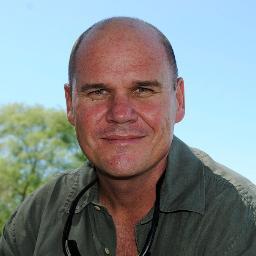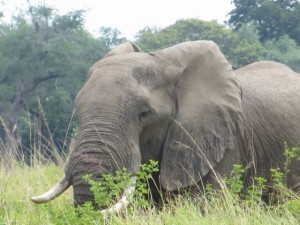I often think back to the day when I was told that there was absolutely nothing that I as an individual could do to help in this continual fight against the evils of poaching. All to often we close our minds to the blood red streaks that mar our African landscape. While the world watches, the images of butchered animals, bodies slightly bloated and legs suspended up in the air leap out of the computer or television, eyes staring unseeingly: pleading for somebody to take notice.
I cannot sit and do nothing. I feel their pain and anguish and beg all of you, ‘courage does not always need to be a huge roar.’ I started jennysjumbojargon in November 2013 with the thought of putting into words through poetry about the continual attack on these animals. I describe the pain and torment that these creatures must feel: this flanks me, the acrid smell of gunfire and the metallic taste of blood that clogs my throat. This is not a violent storm that has bullied its way into the African bush. This is a dark menacing chaos of greed, corruption and destruction. These ruthless killers are turning the African bush into a wild sweltering inferno, flames devouring any animal with tusks or horns. These animals are being hemmed in by a force of angry heat and unrelenting attacks. At the rate these pachyderms are being poached, mortality shadows them and it does not matter how large or small their personal treasure.
I would love to be in a position to stop the demand. All I can do is to share work done by others, support all the wildlife groups and leave that enormous part of the problem to those that have clout. Yao Ming and Jackie Chan are doing amazing work to raise awareness in the Asian countries on the plight of the African elephants and rhinos.
And then of course we have the good men on the ground. Those bush warriors who put their lives on the line to ensure the safety of the wildlife.
It is a life changing experience for the rangers who are witness to the ‘desolation’ long after the poached animal has unburdened its enormous wrinkled body into a spiritual updraft of lightness. Sadly for these animals death does not always come in a single violent stroke.
Rory Young is not only a wildlife tracker and activist who has been fighting against the dark and hungry shadows of poaching all his life, he is also a prolific and exceptional writer. Born in Zambia and brought up in different parts of Africa, he learnt to treat the earth well, reading the signs and stories left by different animals and humans in the bush. He managed to blend in with the natural surroundings that had become his playground and feasting on the wonders of nature. The songs and calls of the bush speak to him. The passion for the bush never left him and he decided to make it his life’s work to combat the poaching problem.
“I found that the very people who had knocked back the poaching in the 90’s were now old, or were replaced with younger, less experienced people who had grown up after the liberation wars and counter insurgency operations of my generation and who had had no training or experience in the very skills needed to win. Very few could track properly and almost none knew how to follow-up poacher spoor as an effective team. Furthermore, the will to win was gone and there was no money because there was also no publicity about what was happening.”
Africa needs many more teams on the ground, doing the actual anti-poaching work. Without them there is really no hope.
Rory has already volunteered much of his time in providing much needed training to wildlife protection teams, but violent groups in the region have now started to look to the ivory trade to fund terrorist activities. Rory is now seeking to implement a full time, comprehensive training program and provide the rangers with the resources they need to carry out their important work.
Chengeta Wildlife.org was started by Lisa Groenweg of Rock Valley, Iowa.
Chengeta Wildlife is a group of people from around the world who formed a nonprofit organization to support Rory Young and the work he does. He has skills and knowledge that the teams protecting wildlife badly need to protect themselves and wildlife. If enough funding is generated we would like to purchase tactical equipment needed by the teams. Things like night vision goggles, thermal sensing equipment and motion sensing cameras. Chengeta Wildlife is run by volunteers. So far 100% of funds raised have gone directly to the field where it is desperately needed. WE HAVE ZERO OVERHEAD COSTS!
Like Lisa, we too can do our bit to help combat the horrors of poaching. Collectively, we can ensure the continuation of Chengeta Wildlife’s ability to adequately train and equip the necessary new generation of rangers required to assist the continuation of the circle of life in elephants within their natural habitats in Africa.
Some people may think it is too late, but where there are elephants and other wildlife….there is hope. Let’s all give a growl of thunder. (My poem)








